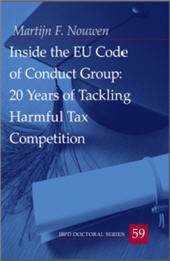2021 - IBFD Publishing
E-book
Versione Digitale
Download | Copia/Incolla (illimitata)
Inside the EU Code of Conduct Group : 20 years of tackling harmful tax competition
 E-PUB
Disponibile anche in PDF
E-PUB
Disponibile anche in PDF xvi, 601 p.
- Includes bibliographical references (p. 573-578).
- This book discusses and evaluates the functioning, work and effectiveness of the diplomatic EU Code of Conduct Group in tackling harmful tax competition within the European Union and beyond. This Group, which celebrated its 20th anniversary on 9 March 2018, brings together representatives of the EU Member States, the European Commission and the Council of the European Union.
- As Member States still adhere to the Code Group's diplomatic character, implying confidentiality and closed meetings, its work is hidden by a veil of confidentiality. However, with the help of the EU Transparency Regulation and much persistence, more than 2,500 unpublished documents on the work of the Group were obtained by the author from the Council of the European Union and the European Commission. They provide a rare glimpse into the governance and work of the Group and, with that, to its effectiveness and the positions of individual Member States on many different tax regimes and tax avoidance practices. In this book, the content of these documents is made available to the reader. In addition to tax law, the book considers other relevant disciplines – such as EU law, economics and political science – to ensure a comprehensive approach.
- This book investigates the historical background and purpose of the political EU Code of Conduct on Business Taxation, its legal status, the governance and working methods of the Group and the geographical and substantive scope of the Code. It assesses the substance and effectiveness of the Group's decisions in respect of national preferential tax regimes (pseudo-case law) and in respect of coordinated tax policies on general competition-sensitive tax issues (pseudo-legislation). It also discusses the interaction between the Code (soft law) and hard law, notably the State aid and market distortion rules. It concludes with an outlook on the Group's future. This book is of value to academics, tax practitioners, tax policymakers, politicians and non-governmental organizations, as well as to anyone interested in the public debate on fair and sustainable taxation. [Publisher's text]
- Thesis.
- 1567469 characters
-
Informazioni
ISBN: 9789087227067
COLLANA


